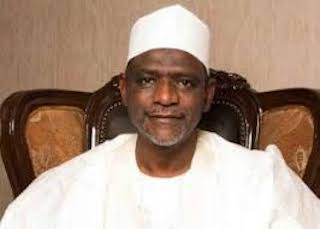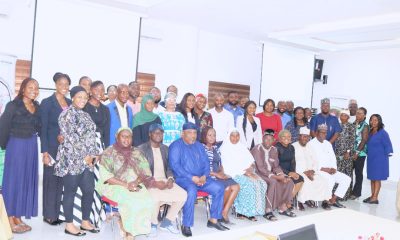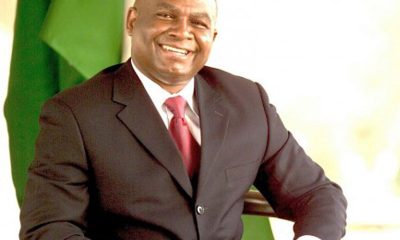Education
Education Sector: FG Invests N1.3trl in Four Years

As CBN plans support for Diagnostic Centres
By Mathew Dadiya, Abuja
President Muhammadu Buhari on Thursday, reiterated his administration’s commitment to providing quality of education in the country.
The President gave the assurance when he inaugurated the newly completed Post-Graduate Centre of Excellence at the Ahmadu Bello University (ABU), Zaria, constructed and donated to the school by the Central Bank of Nigeria (CBN).
Before unveiling the commemorative plaque to formally inaugurate the edifice that sits on a total floor area of 34,102.81sqm, President Buhari said the construction of the project was a testimony to his administration’s effort at supporting qualitative learning from the primary through to the tertiary level.
According to him, his administration, in the past four years, had invested about N1.3 trillion in the educational sector of the country, excluding personnel and overhead costs.The President assured that his administration, in its second term, in spite of funding challenges, will continue to accord education priority by ensuring adequate funding for the sector to make it affordable, qualitative and competitive with what was obtainable in more developed countries.
While lauding the vision of the late Sarduana of Sokoto, Sir Ahmadu Bello in establishing the university, he commended the Central Bank of Nigeria (CBN) for supporting the Federal Government’s investments in the educational sector as well as other keys areas of the economy tied to overall national development, he urged the Bank to sustain such funding support for research and overall economic development.
Welcoming the President to the complex earlier, the Governor, Central Bank of Nigeria, Mr. Godwin Emefiele said the Bank’s involvement in the funding and infrastructural support in the educational sector was borne out of the conviction that an educated workforce played a critical role in the advancement of the Nigerian economy and the society in general.
He said the Bank’s analysis of the factors responsible for the growth of successful economies, indicated that investment in education played a prominent role in driving innovation and growth in advanced and emerging economies, while also contributing to significant reductions in inequality. Hence, he said the CBN, being a knowledge-driven organization, had to ensure the sustenance of improvements in institutions of higher learning across the country.
The Centre of Excellence, according to the apex bank boss, was also designed to accommodate the Central Bank of Nigeria Collaborative Postgraduate Programme (CBN-CPP), which he described as a child of necessity in the Bank’s intervention programme in the educational sub-sector. He explained that the project was conceived to produce a critical mass of skilled professionals that will be able to apply their knowledge towards supporting growth and continued innovation in our nation’s financial sector and the economy in general. “This was against the recognition that the dearth of skilled manpower constituted a binding constraint towards making Nigeria the number 1 hub for economic activity in Africa, he added.
He also disclosed that the three first generation federal universities in the country across the six geo-political zones (Ahmadu Bello University (ABU), Zaria, University of Ibadan (UI), Ibadan and the University of Nigeria (UNN), Nsukka) were selected under the first phase of the intervention programme. He added that the programme was later expanded to cover six other tertiary institutions across Nigeria, which are nearing completion.
He added that the project was mainly to ensure that students at post-graduate levels in Economics, Accounting, Banking and Finance, Business Administration and Statistics study in a serene environment that would stimulate effective learning with a view to building human capacity for the financial services sub-sector.
Emefiele assured that the CBN, working closely with all the participating universities, had taken steps to ensure that this investment yields considerable benefits. Specifically, he said the curricula for the target disciplines had been reviewed and harmonized across board to ensure students are provided with the optimum level of knowledge relative to their peers in other parts of the globe.
“We believe that the Centres of Excellence will help support the government’s efforts towards reducing the incidence of brain drain, and curtail the huge foreign exchange being spent on school fees for Nigerians studying in other countries,” Emefiele said.
While disclosing that the three Centres of Excellence in Zaria, Enugu and Ibadan will commence operation in October 2019, he said the CBN expected the universities to take maximum advantage of the world class facilities provided by the Bank to challenge their counterparts in London, New York and Dubai in the provision of training programmes in banking and finance-related disciplines for the global business community
He also thanked stakeholders in the Federal Ministry of Education, National Universities Commission (NUC), the Ahmadu Bello University, Zaria, and the contractor, Messrs Afdin Nigeria Limited, for their support in completing the project, stressing that such collaborations were necessary for progress.
The Post-Graduate School project, similar to the project inaugurated by President Buhari at the University of Nigeria, Enugu Campus (UNEC) in January 2019, comprises a Faculty building and a block of rooms, as well as a 544-seater auditorium, four lecture and four tutorial rooms, traditional and e-libraries, and a telepresence room.
Meanwhile, the CBN Governor has disclosed plans by the Bank, in the near future, to also provide funding support for the health sector in the country, through the establishment of six diagnostic centres across the geo-political zones of the country.
He said the decision of the Bank to support the health sector was based on the realization that education and health formed the bedrock of development in any society.
Education
How female Medicine Degree Holder Abandoned Certificate for Carpentry- Bugaje

The Executive Secretary, National Board for Technical Education (NBTE), Prof. Idris Bugaje has expressed the need to promote inclusivity, especially for women and persons with disabilities in technical education.
Bugaje stated this in Abuja while assessing the impact of President Bola Tinubu’s administration after two years in office.
He appealed for greater gender inclusivity in vocational and technical education, stressing that deliberate policies such as scholarships and incentives could help bridge the gender gap.
In support of his position, Bugaje shared an inspiring story of a female medical doctor who abandoned her medical career to pursue carpentry.
“There is a story I want to share with you, about a girl who was interested in becoming a carpenter.
“The father was a carpenter and they were four children in the family, three boys and herself.
“Whenever she joined the boys to the workshop, the father would send her away, saying, `you are a girl, go back to the house, you are not supposed to be a carpenter’’.
“Without giving considerations to the passion of the young girl, the father sent her to a medical school.
“She graduated with the MBBS, went and did the one-year internship after graduation, and chose a role as a medical doctor.
“After that, she came back to the father, returned the MBBS certificate to him, and thanked him.
“Afterward, she told the father that her passion is in carpentry, not to practice as medical doctor,” Bugaje narrated
He added that after spending seven years on medical training, the father had no option but to send her to Turkey to learn how to make furniture.
Addressing cultural and societal barriers often faced by young women in technical fields, Bugaje appealed to parents to support their daughters’ interests in trades like plumbing, electrical installation, and carpentry.
He also called on policymakers to prioritise passion and skill development among youth, especially girls, noting that such encouragement could lead to greater innovation and self-reliance.
“If they want to become carpenters, ICT experts, or POP artists, allow them.
“In skills’ training, passion is very important. That’s what motivates children and helps them innovate.
“We need to harness these innovations if the country is to move forward and rise beyond being a third-world nation,” he said.
He emphasized the need to have deliberate policies to encourage women to come into TVET through scholarships and other incentives. (NAN)
Education
WAEC Apologies for Conducting English Exam Late, Cites Leakage Prevention

The West African Examinations Council (WAEC) has apologized for delay in conducting English Language Paper 2 in the ongoing 2025 West African Senior School Certificate Examination (WASSCE).
The took place on Wednesday evening.
In a statement by Moyosola Adesina, Acting Head of Public Affairs Department of
WAEC, the council said that it encountered challenges.
”While maintaining the integrity and security of our examination, we faced considerable challenges primarily due to our major aim of preventing leakage of any paper.
“We recognise the importance of timely conduct of examinations and the impact of this decision on candidates, their schools and parents, and we sincerely apologise for any inconveniences caused,” WAEC stated.
It said that it successfully achieved its objective but it inadvertently impacted the timeliness and seamless conduct of the examination.
“In spite of our best efforts, we encountered logistical hurdles, security concerns and socio-cultural factors that negatively influenced our operations,” WAEC said.
The council re-affirmed its commitment to upholding the highest standard in examination conduct, and pledged to continue to promote academic excellence. (NAN)
Education
FG vows full WAEC CBT shift by 2026 – Minister

The Minister of Education, Dr Tunji Alausa, has reaffirmed the Federal Government’s commitment to fully transitioning to Computer-Based Test (CBT) examinations for the West African Examinations Council (WAEC) and other exam bodies by 2026.
Dr Alausa made this known while monitoring the conduct of WAEC’s CBT examinations in Abuja on Wednesday.
He expressed optimism about Nigeria’s capacity to modernise its examination system and reduce widespread malpractice through digital innovation.
Commending WAEC’s initiative, the minister described the shift from traditional pen-and-paper exams to CBT as a historic and crucial step toward fairness and educational integrity.
“We are working very hard to eliminate fraud in our exam system, and WAEC is taking the lead,” he said.
Highlighting the advantages of CBT, Alausa noted that the system simplified the exam process while significantly curbing cheating.
“We now have clear evidence that when exams are done using technology, the level of fraud is minimised to almost zero,” he stated.
He further lauded WAEC’s internal safeguards, explaining that the CBT system was operated via a secured Local Area Network (LAN), making it “literally impossible” to hack.
According to the minister, by Nov. 2025, all WAEC multiple-choice exams will be conducted using CBT.
He added that essay questions and NECO examinations would follow suit by 2026.
On infrastructure and logistics, particularly in remote areas, Alausa acknowledged the challenges but assured that scalable solutions are in progress.
“Are we going to be ready to provide every single needed infrastructure by November? Absolutely not.
“But as we move into the future, we will be ready. We have to challenge ourselves as government,” he said.
He also addressed concerns over the logistics of conducting multiple exams.
“In WAEC, the average student takes about eight to nine papers.
“They do it over several days. Those are the logistics we, as administrators, have to work through, and we already are,” he explained.
The ongoing WAEC exams, which began on April 24, are scheduled to conclude on June 20, 2025.
A total of 1,973,253 candidates from 23,554 schools are participating. Of this number, 979,228 candidates are male, accounting for 49.63 per cent, while 994,025 candidates are female, making up 50.37 per cent.(NAN)































